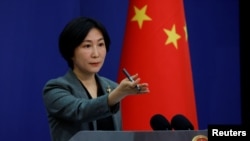China says it was “smeared” in U.S. President Joe Biden’s State of the Union address, in which he called for bipartisan unity to push back against Beijing.
Days after a Chinese surveillance balloon drifted across American airspace, Biden said he remains open to working with Beijing, "where it can advance American interests and benefit the world."
"But make no mistake about it," he said. "As we made clear last week, if China threatens our sovereignty, we will act to protect our country, and we did."
The president also promoted his administration's policies that are increasing trade restrictions on some high-tech equipment, saying those policies are aimed at ensuring advanced technologies "are not used against us."
“Let’s be clear: winning the competition with China should unite all of us. We face serious challenges across the world,” Biden added.
In Beijing early Wednesday, Mao Ning, a spokeswoman with the Ministry of Foreign Affairs, said during a regular briefing that Beijing does not shy away from competition.
“However, we are opposed to defining the entire China-U.S. relations by competition. It is beneath a responsible country to use competition as a pretext to smear other countries and restrain their legitimate right to development, even at the expense of global industrial and supply chains,” she said.
Mao's remarks followed a protest from a senior Chinese diplomat to senior U.S. officials over the shooting down of the surveillance balloon off the coast of South Carolina.
The Chinese Embassy in the United States said its chargé d'affaires, Xu Xueyuan, lodged “stern representations” Tuesday with senior State Department and White House National Security Council officials on what Beijing said was the “U.S.’s attack on a Chinese unmanned civilian airship by force.”
At the Capitol, U.S. lawmakers are expected to be briefed on the balloon later this week, while House Republican leaders are pushing a bipartisan measure to denounce the operation of the spy balloon by the People’s Liberation Army (PLA.)
“China has decided to try to impose its will on the world and move us in a direction that takes us away from the rules-based international system that the United States and so many other nations are trying to impose,” said Democratic Congressman Adam Smith during a Tuesday hearing.
“Under President Xi [Jinping], the Chinese Communist Party has nearly tripled its defense spending in the last decade alone,” said Republican Congressman Mike Rogers, who chairs House Armed Services Committee.
“The [Chinese Communist Party] is not building these new and advanced military capabilities for self-defense. In recent years, the CCP has used its military to push out its borders to threaten our allies in the region and to gain footholds on new continents.”
Rogers warned the Chinese military has more Intercontinental ballistic missile launchers than the United States.
“The danger of the Chinese Communist Party is preoccupying Congress,” said Rebeccah Heinrichs, a senior fellow at the Washington-based Hudson Institute. “A rival nation’s spy balloon just audaciously violated our sovereignty. Downplaying the scope of the threat in the State of the Union address does not make the problem less acute or more manageable.”
Other analysts said the Chinese military is shaping perceptions within the Chinese Communist Party.
“PLA's operations definitely affect China's foreign affairs and global perception of China,” said Drew Thompson, a former Pentagon official and now a senior research fellow at the National University of Singapore's Lee Kuan Yew School of Public Policy.
Meanwhile, as an effort to ensure open lines of communication between the two militaries, the U.S. government is working on a sanction exemption for Li Shangfu, who is widely seen as China’s next minister of national defense when the current minister, Wei Fenghe, retires later this year.
The United States sanctioned Li when he headed the Equipment Development Department of the Chinese military in 2018, due to Chinese purchases of advanced Russian fighters and missile systems.
The United States has already communicated to the Chinese military the exemption plan, according to former CIA top China analyst Dennis Wilder, now a professor at Georgetown University, citing conversations with U.S. officials.
“We are entering a tense period and it will take depth diplomacy on both sides to make sure that things do not spiral downward,” Wilder told VOA.
The U.S. Department of State has yet to respond to VOA’s request for comment.
Last Saturday, the PRC declined a U.S. request for a secure call between their defense chiefs after the U.S. shot down the Chinese balloon. The U.S. Department of Defense said deconfliction talks are critical in a tense moment and the U.S. commitment to open lines of communication will continue.





